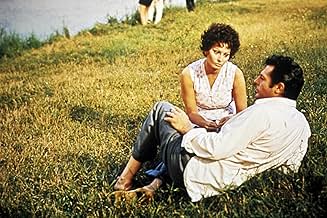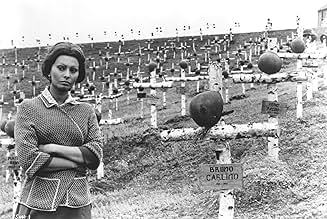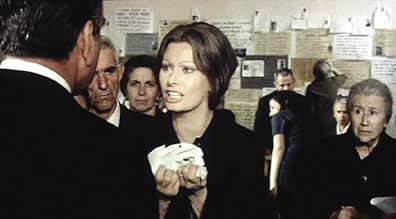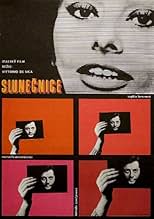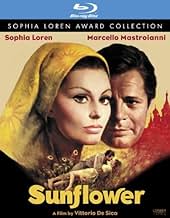IMDb रेटिंग
7.3/10
4.9 हज़ार
आपकी रेटिंग
अपनी भाषा में प्लॉट जोड़ेंAn Italian woman conducts a desperate search for her husband, a soldier considered missing in action in Russia during WWII.An Italian woman conducts a desperate search for her husband, a soldier considered missing in action in Russia during WWII.An Italian woman conducts a desperate search for her husband, a soldier considered missing in action in Russia during WWII.
- निर्देशक
- लेखक
- स्टार
- 1 ऑस्कर के लिए नामांकित
- 1 जीत और कुल 2 नामांकन
Lyudmila Saveleva
- Mascia
- (as Ljudmila Saveljeva)
Nadya Serednichenko
- Contadina russa
- (as Nadja Cerednicenko)
Gunars Cilinskis
- Funzionario russo
- (as Gunnar Zilinskij)
Carlo Ponti Jr.
- Giovanna's Baby
- (बिना क्रेडिट के)
Mariya Sapozhnikova
- Passerby
- (बिना क्रेडिट के)
फ़ीचर्ड समीक्षाएं
As another reviewer pointed out this bit of cold war propaganda (pro Soviet) was absurdly impossible. An axis soldier would have been shot period or arrested as a spy and killed slowly in a prison camp.
So you have to dismiss the story as absurd as it stands and place it in Iran or Finland or some place where it could have happened. Or just suspend your disbelief.
Once you do that you can enjoy this bit of really well done maudlin romance. Loren had to be at the height of her classy beauty in this film (before she was aged for the story).
I loved the part where she spots an Italian man---the only handsome well dressed stylish man in any of the Russian scenes. Of course Loren herself is like a super nova star compared to the kerchiefed thick legged Russian women. Italian audiences must have loved this film.
I give it a 7 as it is very enjoyable once you deal with the absurd story and the maudlin nature of the movie. As another reviewer states what is so wrong with first class maudlin??
So you have to dismiss the story as absurd as it stands and place it in Iran or Finland or some place where it could have happened. Or just suspend your disbelief.
Once you do that you can enjoy this bit of really well done maudlin romance. Loren had to be at the height of her classy beauty in this film (before she was aged for the story).
I loved the part where she spots an Italian man---the only handsome well dressed stylish man in any of the Russian scenes. Of course Loren herself is like a super nova star compared to the kerchiefed thick legged Russian women. Italian audiences must have loved this film.
I give it a 7 as it is very enjoyable once you deal with the absurd story and the maudlin nature of the movie. As another reviewer states what is so wrong with first class maudlin??
meeting between two great actors and an impressive director. images from Italy and picture of Russia in the air of Cold War.a basic story about a couple, a war and a choice. a travel and the form of truth. beautiful music and force of unspoken words. that is all. or only gentle performance of Ludmila Savelieva. a great film. not for cast or dramatic slices, for the force of emotions or for the sunflower as vegetable testimonies about a tragedy. but only for its virtue to be a seed. a seed of questions and answers. an exercise of empathy. a sad love story in which love is more than feeling. a poem but just a very special poem. mixture of pure joy, shadows of war, a miracle and a search, it is homage to a sacrifice generation and reflection of deep need of sense in a chaotic world. nothing pink, nothing cold. only picture of a man, a young Russian woman who speaks Italian, a charming Sophia Loren and same Mastroianni. but the essence is possession of public.
I suppose this film is just a maudlin melodrama, so is the music by Mancini. But then..., what a marvelous maudlin melodrama!... Why shouldn't it be? what's wrong with maudlin melodramas? If they are well done and authentic with their characters, if we get wrapped up with their emotions..., well, can you ask for anything more?
I just saw this movie on "You Tube" for the second time. I remember seen it on late TV in Italy, many years ago, and the impression was so powerful that after somebody mentioned it a few days ago --I didn't remember any more this title until they mentioned it-- I decided to look for it and watch it again, to see after so many years if the impression was still the same (so many films are a total disappointment when seen for a second time years later), but it wasn't the case with this one.
The story is so poignant that it can hold on its own very well no matter the change in mores and film technical improvements, it definitely grabs your interest till the very end (I must admit the film is far from perfect, since, for example, there are no indications of how many years went by or the new life style Sophia's character turns to after her Russian trip.
It also has two climaxes, both marvelous, but I think they should have decided for one or the other, two climaxes is too much within the same movie, and the length should have been shortened quite a bit.
Anyhow, forget about the lachrymose side of the story and submerge yourself in it (also get some Kleenex handy because everybody will need them, and plenty) and if you have to have a good cry, well, have it and enjoy it!! (After all is just a movie).
I just saw this movie on "You Tube" for the second time. I remember seen it on late TV in Italy, many years ago, and the impression was so powerful that after somebody mentioned it a few days ago --I didn't remember any more this title until they mentioned it-- I decided to look for it and watch it again, to see after so many years if the impression was still the same (so many films are a total disappointment when seen for a second time years later), but it wasn't the case with this one.
The story is so poignant that it can hold on its own very well no matter the change in mores and film technical improvements, it definitely grabs your interest till the very end (I must admit the film is far from perfect, since, for example, there are no indications of how many years went by or the new life style Sophia's character turns to after her Russian trip.
It also has two climaxes, both marvelous, but I think they should have decided for one or the other, two climaxes is too much within the same movie, and the length should have been shortened quite a bit.
Anyhow, forget about the lachrymose side of the story and submerge yourself in it (also get some Kleenex handy because everybody will need them, and plenty) and if you have to have a good cry, well, have it and enjoy it!! (After all is just a movie).
Vittorio de Sica achieved a remarkable feat in this eye-catching 1970 production, bringing together Americans and Soviets, in the midst of the Cold War, in the co-production of a Franco-Italian film.
From the Americans he got a memorable soundtrack, written and directed by Henry Mancini and nominated for an Oscar. From the Soviets he received the footage from Mosfilm, directed by Andrey Konchalovskiy, as well as the actress Ludmila Saveleva.
The script by Tonino Guerra and Cesare Zavattini has everything it needs to work, but the film gets lost somewhere in between so many attributes.
The story is basic and excessively melodramatic. The soundtrack is beautiful but quickly becomes cloying. The footage of the sunflower fields and the cemeteries of Russian combatants is powerful and eloquent, but inconsequential. This is, after all, a story of the living, not the dead. Only the final notes of the fatalism of war, which determines people's fates, far beyond their individual will, remain to give the film any meaning.
But it is not enough. A final result clearly less than the sum of its parts.
From the Americans he got a memorable soundtrack, written and directed by Henry Mancini and nominated for an Oscar. From the Soviets he received the footage from Mosfilm, directed by Andrey Konchalovskiy, as well as the actress Ludmila Saveleva.
The script by Tonino Guerra and Cesare Zavattini has everything it needs to work, but the film gets lost somewhere in between so many attributes.
The story is basic and excessively melodramatic. The soundtrack is beautiful but quickly becomes cloying. The footage of the sunflower fields and the cemeteries of Russian combatants is powerful and eloquent, but inconsequential. This is, after all, a story of the living, not the dead. Only the final notes of the fatalism of war, which determines people's fates, far beyond their individual will, remain to give the film any meaning.
But it is not enough. A final result clearly less than the sum of its parts.
You know the plot.
Sunflower was Vittorio De Sica's last film. It was dismissed by the critics as hopelessly maudlin melodrama. But anyone who cares enough to be reading this no doubt knows the humanity he crafted into every frame, and the beauty and sadness of life it evokes.
Henry Mancini's theme song is, IMVHO, the very best he ever wrote. I'm reduced to tears every time I hear it. Yet it seems Mancini himself treated as a lesser child. His daughter recorded it to lyrics better left forgotten.
Sunflower was Vittorio De Sica's last film. It was dismissed by the critics as hopelessly maudlin melodrama. But anyone who cares enough to be reading this no doubt knows the humanity he crafted into every frame, and the beauty and sadness of life it evokes.
Henry Mancini's theme song is, IMVHO, the very best he ever wrote. I'm reduced to tears every time I hear it. Yet it seems Mancini himself treated as a lesser child. His daughter recorded it to lyrics better left forgotten.
क्या आपको पता है
- ट्रिवियाThe child of Giovanna (Sophia Loren) in this film was actually Loren's from her partnership with producer Carlo Ponti.
- गूफ़Mascia tells Giovanna that when she found Antonio, he was hurt so badly that he had forgotten everything, including his own name. If that's true, then how did Mascia know his name was Antonio?
- कनेक्शनEdited into Marcello, una vita dolce (2006)
टॉप पसंद
रेटिंग देने के लिए साइन-इन करें और वैयक्तिकृत सुझावों के लिए वॉचलिस्ट करें
- How long is Sunflower?Alexa द्वारा संचालित
विवरण
- चलने की अवधि
- 1 घं 47 मि(107 min)
- ध्वनि मिश्रण
- पक्ष अनुपात
- 1.85 : 1
इस पेज में योगदान दें
किसी बदलाव का सुझाव दें या अनुपलब्ध कॉन्टेंट जोड़ें


